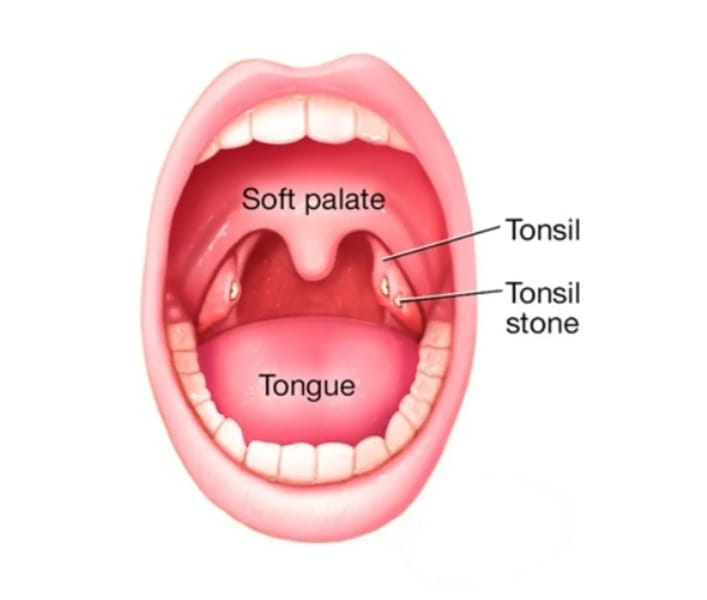Bad Breath (Halitosis) Myths in Kenya: Why Brushing Alone Probably Won't Stop It
Most persistent bad breath among Kenyans isn’t caused by poor brushing habits but by tonsil stones. Learn safe and effective ways to manage halitosis at home.
Most persistent bad breath among Kenyans isn’t caused by poor brushing habits but by tonsil stones. Learn safe and effective ways to manage halitosis at home.

Photo: Fit Savanna
You probably know someone who has persistent bad breath, and you may have wondered, "Why don't they just brush their teeth?"
Or perhaps you think they don't brush properly, maybe they forget to floss or clean their tongues.
The truth is, they probably clean their teeth more often than you do. In fact, many people with persistent bad breath are very aware of the problem, but they don't understand why it never goes away.
Bad breath can be caused by many things: from poor oral hygiene and dry mouth to smoking, certain foods, or medical conditions such as sinus infections.
However, in most cases, persistent or stubborn bad breath isn't due to these issues or how often you brush your teeth; it's because of tonsil stones, scientifically known as tonsilloliths.
"The presence of a tonsillolith (tonsil stones) represents a tenfold increased risk of abnormal VSC halitometry (bad breath)"
Your tonsils naturally have small crevices called crypts. These are part of your immune system that trap bacteria, dead cells, and food particles, so your body can recognize and fight infections.

However, if you have issues like post-nasal drip, chronic throat infections, or allergies, those crypts can become ideal hiding spots for bacteria.
Over time, bits of food and debris can get lodged in there, harden, and form yellowish-white calcified stones that smell absolutely terrible.
If you have tonsil stones, no amount of brushing, flossing, or tongue cleaning will help (trust me, I know from experience).
The moment you close your mouth, the smell comes right back. It's extremely embarrassing and can quietly ruin your social life, either by making you withdraw or by making others withdraw from you.
The good news is that once you realize your bad breath comes from tonsil stones, the solution is usually simple and often inexpensive.
One of the most effective methods is to flush them out using a syringe.
This can be easily imported from online platforms like AliExpress for about KES 400-500, including shipping, though you'll need to wait about 2 weeks for delivery.

If you have this syringe, just fill it with clean, preferably salty, water and gently flush the back of your throat or tonsil area several times. The stones will gradually come out.
Alternatively, you can use a tonsil stone removal scoop, which is often sold together with the syringe. This tool allows you to carefully dislodge the stones if they're visible.
If you can't access these tools, or if the stones are large and hard to remove, visit a healthcare facility to have them flushed out professionally.
For the best results, see an ENT (Ear, Nose, and Throat) specialist, who can diagnose and treat the condition safely.
The most important thing to understand is that tonsil stones are usually a symptom of other underlying issues.
As mentioned earlier, these often include post-nasal drip, chronic throat infections, or allergies that cause mucus and debris to collect around the tonsils.
This means tonsil stones may keep coming back occasionally for many people. However, you can reduce how frequently they form by maintaining consistent oral hygiene and lifestyle habits.
The most effective prevention measures include:
These habits are especially important if you regularly consume dairy products such as milk, greek yoghurt, or whey protein.
While not conclusively researched, some ENT professionals speculate that frequent dairy intake may increase the risk of developing tonsil stones because it leaves sticky residues that cling to the tonsils.
This is especially relevant for fitness enthusiasts who use whey or casein protein powders; awareness and proper oral care can make all the difference.
Finally, stay hydrated. Adequate water intake helps maintain healthy saliva production, which is your body's natural way of cleansing the mouth and throat.
While tonsil stones can be embarrassing, they are usually harmless. With proper hygiene, hydration, and awareness, you can easily manage or prevent them and breathe with confidence again.
Edited and proofread by Grace Njoroge, Copy Editor, Fit Savanna.
Medical Disclaimer: The information provided in this article is for informational purposes only. It does not constitute medical advice, diagnosis, or treatment. Always seek the advice of your physician, ENT specialist, or other qualified health provider regarding any questions about a medical condition.
Continue reading with these related fitness and health articles




Join the conversation!
Share your thoughts on "Bad Breath (Halitosis) Myths in Kenya: Why Brushing Alone Probably Won't Stop It" below.